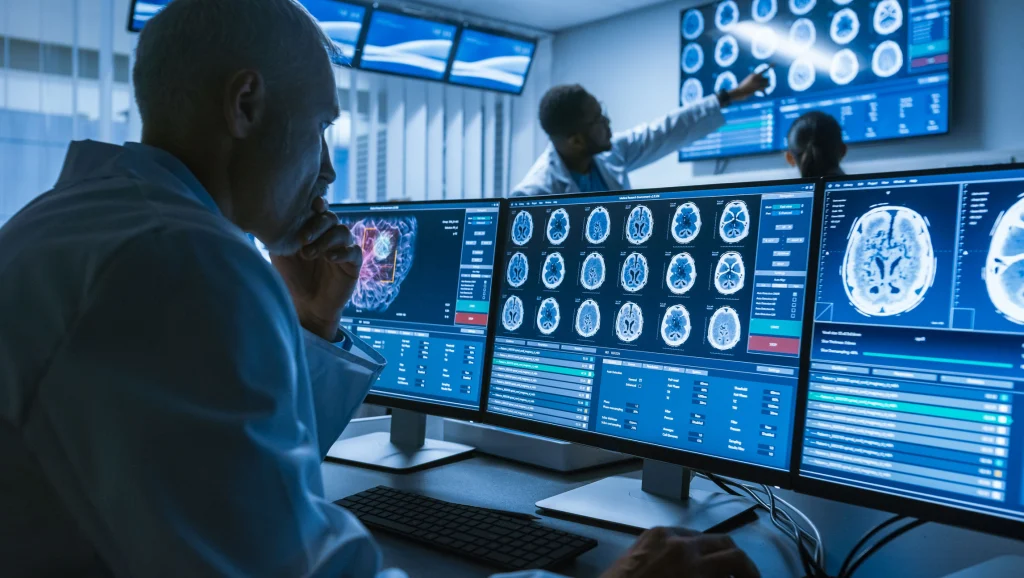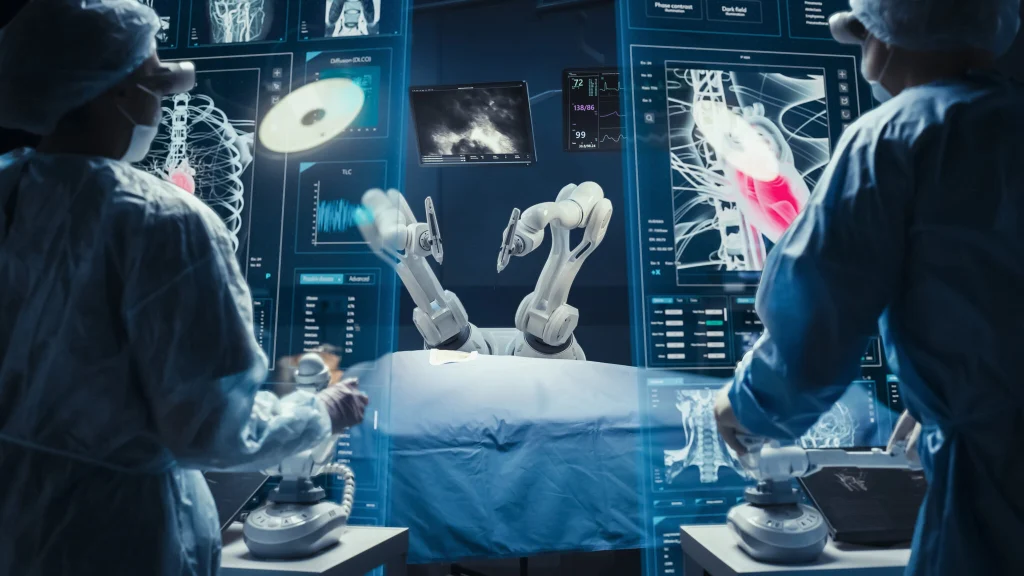In recent years, Artificial Intelligence (AI) has emerged as one of the most transformative technologies across various industries, with healthcare being no exception. The application of AI in healthcare is already reshaping the way doctors diagnose, treat, and manage diseases. As AI continues to evolve, its potential to revolutionize healthcare becomes more apparent, offering new opportunities to improve patient care, streamline operations, and enhance medical research. In this blog, we’ll explore how AI is transforming the healthcare, its current applications, and what the future holds for this innovative technology.
The Rise of Artificial Intelligence in Healthcare
AI refers to the simulation of human intelligence in machines designed to perform tasks typically requiring human cognitive functions such as problem-solving, learning, and pattern recognition. In healthcare, AI systems leverage vast amounts of data to make predictions, assist in diagnostics, and provide personalized treatment recommendations.
The healthcare industry is grappling with rising patient volumes, a shortage of skilled professionals, and the increasing complexity of medical conditions. AI addresses these challenges by enhancing clinical decision-making, improving operational efficiency, and enabling advanced medical technologies.

AI Diagnostics For Early Detection Of Disease
One of the most promising applications of AI in healthcare is in the field of diagnostics. AI, particularly machine learning algorithms, are being used to analyze medical images such as X-rays, MRIs, and CT scans with remarkable precision. These algorithms are trained on thousands of medical images and can detect subtle patterns or anomalies that may be overlooked by human eyes.
For instance, AI systems have been developed to diagnose conditions like cancer, heart disease, and neurological disorders at an early stage, when treatment outcomes are more favorable. The speed and accuracy of AI-driven diagnostics can significantly reduce the time required for diagnosis and provide early interventions that can save lives.
Pro Tip
The integration of AI in diagnostic imaging can support radiologists in their decision-making process, but it’s essential to remember that AI tools should complement, not replace, human expertise.

Personalized Medicine: Treatments to Individuals
Personalized medicine is an emerging field that uses genetic, environmental, and lifestyle factors to tailor medical treatments to individual patients. AI plays a pivotal role in this process by analyzing large datasets of patient information, including genetic sequences, medical history, and lifestyle habits. AI algorithms can help identify patterns in this data, leading to more accurate predictions of how different patients will respond to various treatments.
For example, in oncology, AI can analyze a patient’s genetic profile to recommend the most effective chemotherapy regimen or immunotherapy option. Similarly, AI can help physicians identify the right combination of drugs for patients with complex conditions such as diabetes or autoimmune disorders.
Expert View
According to Dr. Eric Topol, a renowned cardiologist and author of Deep Medicine, AI in personalized medicine has the potential to bring about a paradigm shift in how doctors approach treatment, moving from a “one-size-fits-all” model to more individualized and precise care.
AI and Robotics Transforming Surgical Precision
AI is also making significant strides in the field of surgery. Robotic systems powered by AI, such as the da Vinci Surgical System, are already being used to assist surgeons in performing minimally invasive procedures with greater precision. These robotic systems use AI algorithms to analyze real-time data during surgeries, helping surgeons make more accurate incisions and reducing the risk of complications.
AI-driven robotics have shown great potential in complex surgeries, such as heart bypass surgeries or prostatectomy. These systems can also enable surgeons to perform surgeries remotely, offering greater flexibility and access to specialized care for patients in remote or underserved areas.
Pro Tip
As AI-driven surgical robots become more advanced, it’s crucial for medical institutions to invest in comprehensive training for surgeons to ensure optimal utilization of these technologies.

AI in Healthcare Operations Streamlining Processes
AI is not only revolutionizing patient care but also transforming the way healthcare organizations operate. From appointment scheduling to inventory management, AI is streamlining administrative tasks that traditionally require significant human intervention.
For example, AI chatbots and virtual assistants are being used to handle patient inquiries, schedule appointments, and provide follow-up reminders, significantly reducing the administrative burden on healthcare staff. Similarly, AI systems are improving the management of medical supplies and pharmaceuticals, predicting demand, and optimizing inventory levels to avoid shortages or waste.
Expert View
Healthcare experts believe that AI’s potential to optimize administrative processes can lead to significant cost savings, freeing up resources that can be redirected toward improving patient care.
AI and Big Data Accelerating Medical Research
AI is also playing a key role in accelerating medical research by analyzing vast amounts of data to uncover new insights and develop innovative treatments. Researchers use AI to sift through medical literature, clinical trials, and patient data to identify trends and patterns that would be impossible for humans to detect manually.
AI tools are particularly useful in drug discovery, where they can predict how new compounds will interact with the body, accelerating the process of bringing new medications to market. Furthermore, AI algorithms can help identify potential biomarkers for diseases, leading to the development of more effective diagnostic tools.
Pro Tip
AI-powered analytics platforms can empower researchers to make data-driven decisions, but it’s crucial to ensure the data is accurate, diverse, and representative to avoid biased results.
AI in Healthcare: Ethical and Privacy Concerns
As with any disruptive technology, the widespread adoption of AI in healthcare raises important ethical and privacy concerns. Ensuring that AI systems are transparent, explainable, and free from bias is essential for building trust among patients and healthcare providers.
Moreover, patient data privacy is a critical issue when it comes to AI in healthcare. AI systems require access to vast amounts of sensitive health data, making it essential to implement strong data protection measures and comply with regulations such as the Health Insurance Portability and Accountability Act (HIPAA) in the United States.
Expert View
Dr. Topol emphasizes the need for “trustworthy AI” in healthcare, which means ensuring that AI algorithms are transparent, interpretable, and ethical, while safeguarding patient privacy.
The Future of AI in Healthcare
Looking ahead, the future of AI in healthcare appears incredibly promising. As AI technologies continue to evolve, we can expect even more sophisticated applications, such as:
1. AI in Drug Development
AI-powered platforms will continue to expedite drug discovery and clinical trials, bringing new treatments to market faster and at lower costs.
2. AI for Mental Health
AI will play an increasing role in the diagnosis and treatment of mental health disorders, using natural language processing to analyze patient conversations and detect signs of mental distress.
3. AI and Telemedicine
AI will enhance telemedicine platforms by offering virtual consultations, remote monitoring, and AI-assisted diagnostics, improving access to healthcare in remote and underserved regions.
For Your Information
- The health benefits of intermittent fasting. Is it right for you? Click here and know some interesting facts.
- Why heart disease is the leading cause of death worldwide Read more and know some facts.
Conclusion
AI is poised to revolutionize the healthcare sector, from improving diagnostic accuracy and enhancing personalized treatments to streamlining administrative tasks and accelerating medical research. However, for AI to truly transform healthcare, it’s crucial to address ethical concerns, ensure privacy protections, and invest in the training of healthcare professionals to harness the power of AI effectively.
As AI continues to evolve, we can look forward to a future where healthcare is more accessible, efficient, and personalized, ultimately improving outcomes for patients worldwide.
By staying informed and embracing AI-driven innovations, healthcare providers and patients alike will benefit from the vast potential this technology offers.